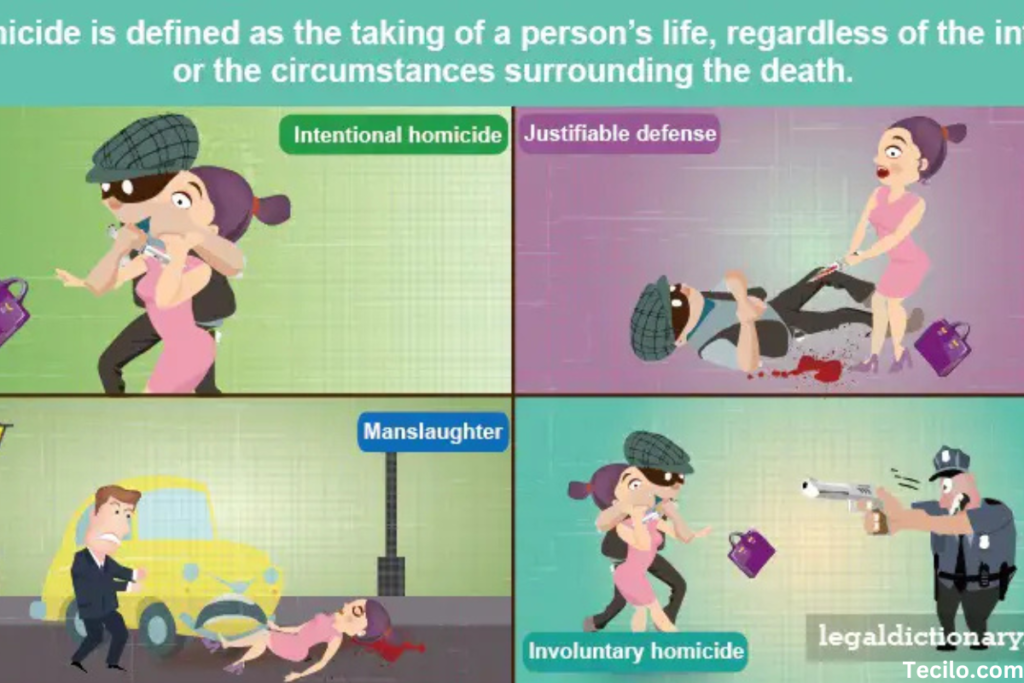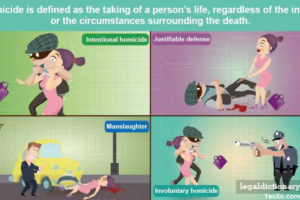
What is Homicide? Homicide is a term that often sparks fear, confusion, and curiosity. But what exactly is it? Homicide is the act of one person killing another, to put it simply.
It’s a broad legal term that encompasses both criminal acts (such as murder) and non-criminal acts (such as self-defense). Understanding homicide is important not only for legal professionals but also for the general public, as it helps us navigate discussions about crime, justice, and safety.
Types of Homicide
What is Homicide is not a one-size-fits-all term. Depending on the circumstances and intent, homicides are classified into different categories under the law.
Legal Classifications of Homicide
What is Homicide is divided into two major categories: criminal and non-criminal. Criminal homicides involve unlawful killings, while non-criminal What is Homicide occur in cases such as self-defense or legal executions.
Murder
Murder is the most severe form of criminal homicide, characterized by intent and malice. Three degrees are commonly used to categorize murder:
First-Degree Murder: This involves premeditation, meaning the killing was planned in advance.
- The most severe punishments, such as life in prison or, in certain states, the death penalty, are meted out for first-degree murder.
- Second-Degree Murder: This occurs when a person intends to kill someone but without premeditation. The act is deliberate but not planned.
- Third-Degree Murder: Also known as manslaughter in some areas, third-degree murder is less severe than the first two categories, typically involving reckless behavior that leads to a death.
Manslaughter
Manslaughter is a form of homicide that lacks the intent to kill. It is separated into two primary groups:
Voluntary Manslaughter: This occurs when a person kills someone in the heat of passion, typically following a provocation. A bar fight that turns deadly, for instance, might qualify as voluntary manslaughter.
Involuntary Manslaughter: This happens when someone acts carelessly or recklessly and inadvertently results in death. A common example is a fatal car accident caused by reckless driving.
Justifiable Homicide
Not all What is Homicideare illegal. Justifiable homicide occurs when a person kills someone in self-defense or in the defense of others. Law enforcement officers, for example, may commit justifiable homicide in the line of duty when necessary to protect lives.
Homicide vs. Murder: Understanding the Differences
It’s crucial to understand that not all homicides are murders. While murder involves intent, other forms of homicide, such as manslaughter or justifiable homicide, do not. This distinction is important in legal cases, as the classification determines the severity of the charges and penalties.
The Legal Process for Homicide Cases
What is Homicide cases follow a complex legal process that involves several stages, from investigation to trial and sentencing.
Investigating a Homicide
Law enforcement plays a crucial role in investigating homicides. Detectives gather evidence, interview witnesses, and work with forensic experts to piece together the events leading up to the death.
Arrest and Charges
Once enough evidence is gathered, law enforcement may arrest a suspect and formally charge them with a crime. The type of charge—whether it’s murder, manslaughter, or another classification—depends on the circumstances of the case.
Trials and Sentencing
If a What is Homicide case goes to trial, both the prosecution and defense present evidence and arguments before a judge or jury. Sentencing is the next step if the defendant is found guilty.
Punishments vary depending on the type of What is Homicide, with murder typically carrying the harshest penalties.
Psychological Aspects of Homicide
What motivates a person to commit homicide? The reasons vary widely, from personal conflicts to mental health issues. In some cases, psychological disorders play a role, particularly in crimes involving passion or irrational behavior.
Global Homicide Rates and Statistics
What is Homicide rates vary significantly around the world. Some countries, such as those with high levels of poverty or conflict, experience more homicides, while others have lower rates due to stricter laws and better law enforcement.
Causes of Homicide
Several societal factors contribute to homicide, including economic disparities, social unrest, and access to weapons. Personal conflicts, such as revenge or jealousy, also play a role in many homicides.

Homicide Prevention and Intervention
Preventing homicide requires a multifaceted approach, including community policing, education, and mental health services. Programs that address underlying causes, such as poverty and substance abuse, are also crucial.
Notorious Homicide Cases in History
Throughout history, certain homicide cases have captured the public’s attention, such as the infamous cases of Jack the Ripper or the assassination of prominent figures like John F. Kennedy. These cases often lead to changes in law enforcement tactics and public perception of crime.
Homicide in Popular Culture
What is Homicide is a common theme in movies, TV shows, and novels. While these portrayals can be entertaining, they often exaggerate or oversimplify the complexities of real-life homicide investigations.
Legal Consequences of Homicide
The legal consequences of homicide vary depending on the severity of the crime. Murder carries the most severe penalties, while manslaughter and justifiable homicides may result in lesser or no punishment.
The Role of Forensic Science in Solving Homicide Cases
Forensic science has revolutionized the way homicide cases are solved. DNA evidence, fingerprint analysis, and ballistics testing have become crucial tools for law enforcement in identifying suspects and solving cases.
Victim Support in Homicide Cases
The families of homicide victims often struggle to cope with their loss. Victim advocacy groups provide support, helping families navigate the legal system and find emotional closure.
The Future of Homicide Investigations
Advancements in technology, such as facial recognition software and artificial intelligence, promise to make homicide investigations faster and more accurate in the future.
Conclusion
What is Homicide is a complex and multifaceted issue that affects societies around the world. From the legal definitions and classifications to the psychological motivations and prevention strategies, understanding homicide is crucial for both professionals and the general public.
FAQs
- What is the difference between homicide and murder?
Murder is a type of homicide, but not all homicides are considered murder. Murder involves intent, while other homicides, like manslaughter, may not. - Can homicide ever be legal?
Yes, justifiable homicide, such as killing in self-defense, is considered legal under certain circumstances. - What are the penalties for homicide?
Penalties





